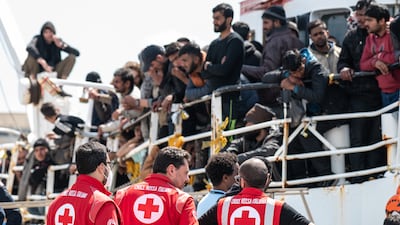A legal battle is escalating between Mediterranean Sea rescuers and Italy's hardline government as both sides refuse to back down in a struggle over migration.
Rescue teams say Prime Minister Giorgia Meloni is stepping up efforts to seize their ships and have their crews branded as criminals for helping asylum seekers reach Europe. Lawyers report death threats in a heated atmosphere in which Ms Meloni and her party openly rage at the "judicial left".
Ms Meloni has legal troubles of her own. Judges in Italy have blocked plans to turn migrants back to North Africa, detain them at a centre in Albania and declare Bangladesh a safe country. Rescue crews are fighting back in the courts with demands for compensation for their seized vessels.
The legal back-and-forth in Italy is one example of how Europe's bitter migration debate is increasingly playing out in the courts. In Italy, France and Greece, activists outvoted in elections and parliaments have turned to judges as a last throw of the dice to block policies they say violate human rights, while in Poland, Germany and the Netherlands, governments are testing the limits of European legal norms to quell voter anger over migration.

Italy is the first port of call for tens of thousands of migrants every year who depart North Africa by sea in the hope of reaching Europe. Almost 30,000 people have landed this year from Bangladesh, Syria, Tunisia and Egypt alone, more than half the total.
Since 2023, rescue ships have spent more than 500 days detained in ports with 600 more taking circuitous routes assigned under an Italian decree, said Mirka Schaefer of SOS Humanity, which runs the ship Humanity 1. She said the death rate was rising in the Mediterranean due to a "new escalation level" of obstruction.
"The problem is that we must appeal each case of detention, and we have to go back to court in every single case, which is lengthy and time-consuming and also costly," she told The National. "While NGOs [non-governmental organisations] are forced to spend time and money in courts, people are dying at sea."
Trial spectacles
On each side of Italy's debate there are champions fighting high-profile legal battles. On the right is Deputy Prime Minister Matteo Salvini, a coalition partner of Ms Meloni. Prosecutors are seeking a six-year prison sentence for him for blocking a ship in the grip of a scabies outbreak from landing at an Italian port.
"Between human rights and the protection of state sovereignty, it is human rights that must prevail in our fortunately democratic system," prosecutor Geri Ferrara told a court in Palermo. Right-wing figureheads including Hungary's Viktor Orban and France's Marine Le Pen rallied around Mr Salvini during the trial.

Bracing for a December verdict, Mr Salvini said on Thursday he was proud to have defended Italy's borders. He accused judges of making "another anti-Italian decision" by pausing a decree declaring Bangladesh a safe country, reasoning that even Nazi Germany could have felt safe for some. If a judge "feels like a communist, they can take off their robe and run for election, but let the government and politicians take forward the agenda chosen democratically by our citizens," Mr Salvini said.
In the other corner is the crew of the Iuventa, a group of rescuers who faced up to 20 years in prison for human trafficking. Netflix last month unveiled plans for a feature-length dramatisation of the seven-year saga, which ended when an Italian judge threw the case out in April.
The crew, who denied collusion with traffickers and rejected accusations from Italian politicians of acting as "sea taxis" for migrants, hit back on Thursday by filing a compensation case against the Italian government. "We think those responsible should compensate for the damage they have caused," a lawyer said.

Hardline policies
Tackling illegal migration is the Meloni government's flagship agenda, with policies including a $700 million deal with Albania to house asylum seekers at a detention centre. A first group of migrants from Bangladesh and Egypt arrived last month before judges blocked their detention.
Ms Meloni attacked the verdict by Rome magistrates as “prejudiced” and promised to overcome any judicial obstacle. Judges drew on a European Court of Justice decision only days earlier that ruled parts of countries could not be declared safe. Italy responded by declaring all of Bangladesh and Egypt safe. That too has been sent to the EU court for review.
One of the judges in the Albania case, Silvia Albano, had a "mud machine" thrown at her that included threats to her life, said an association of magistrates. Prosecutors in the Salvini trial have also been given protection.

Activists say Italy's hardline laws, which require rescue ships to head straight to a designated port or face €50,000 ($54,300) fines, are at odds with international norms and put them in a conflicting position when effectively asked to ignore distress calls along the way.
Italy has impounded ships accused of failing to co-operate with coastguards in Libya, something rescuers are reluctant to do because of human rights concerns despite Ms Meloni hailing co-operation between the two countries on a visit this week. In one recent case, the guards fired into the water to force 78 people back to shore, one of whom drowned, alleges SOS Humanity.
"They are assigning distant ports in north and eastern Italy for the disembarkation of survivors, thereby postponing their access to fundamental rights such as basic needs and appropriate medical care. This is a violation of international medical law," Ms Schaefer said. "We will not be intimidated even in the face of all this obstruction, because we are working strictly according to international and European law."


